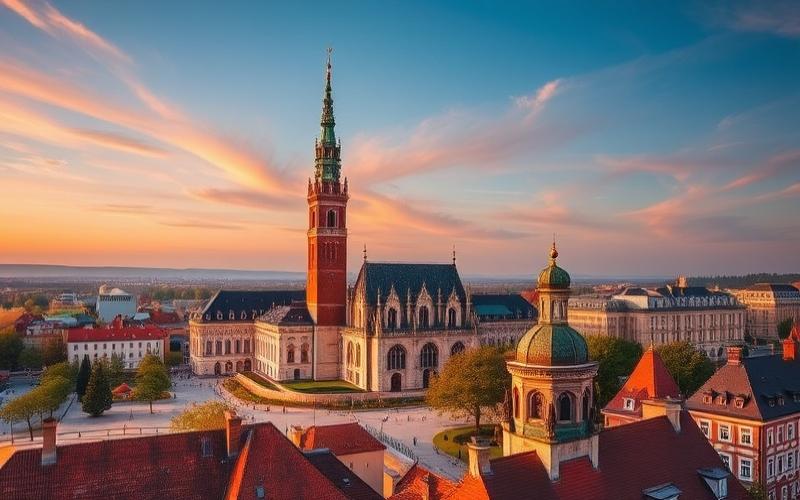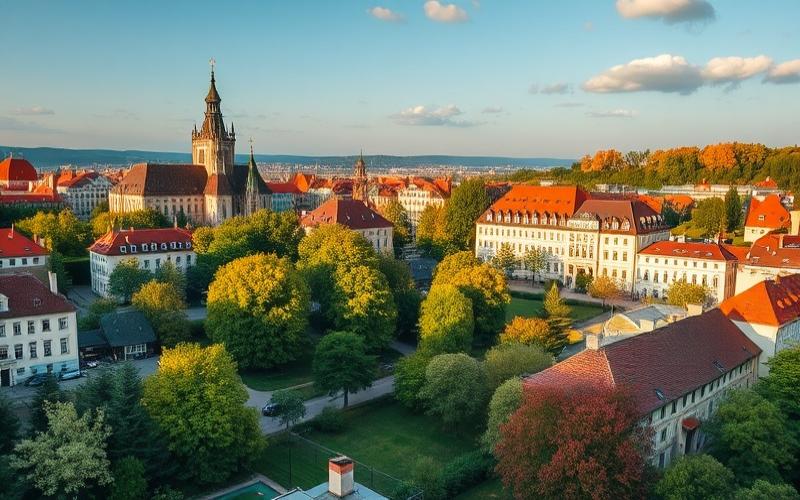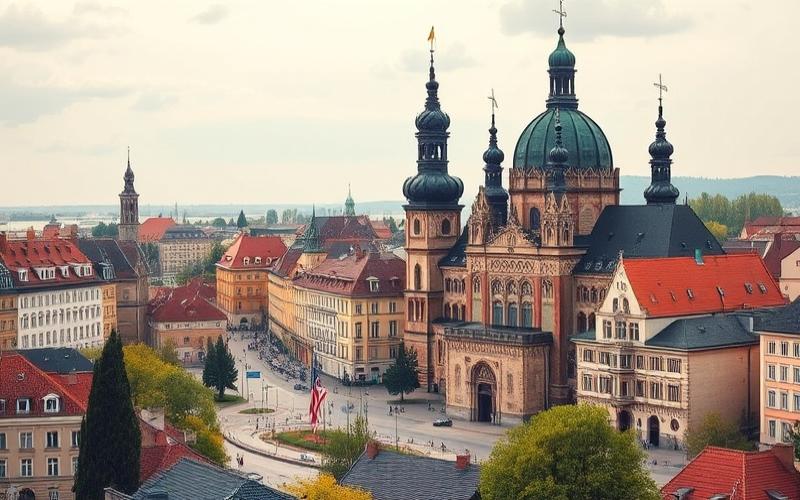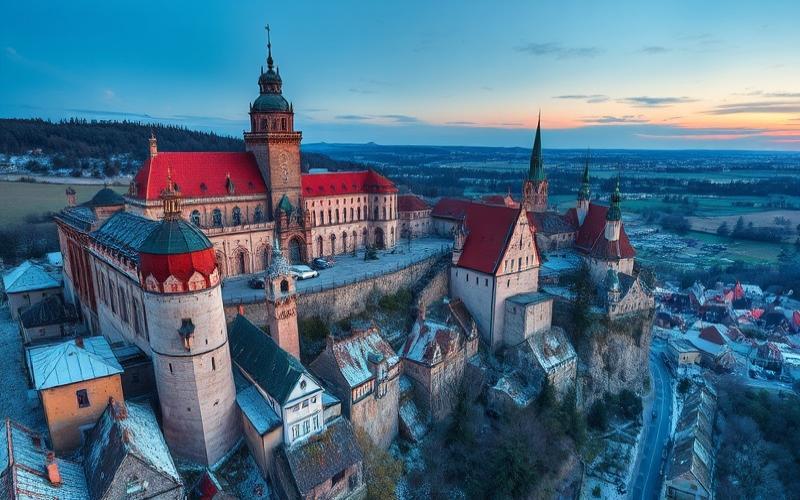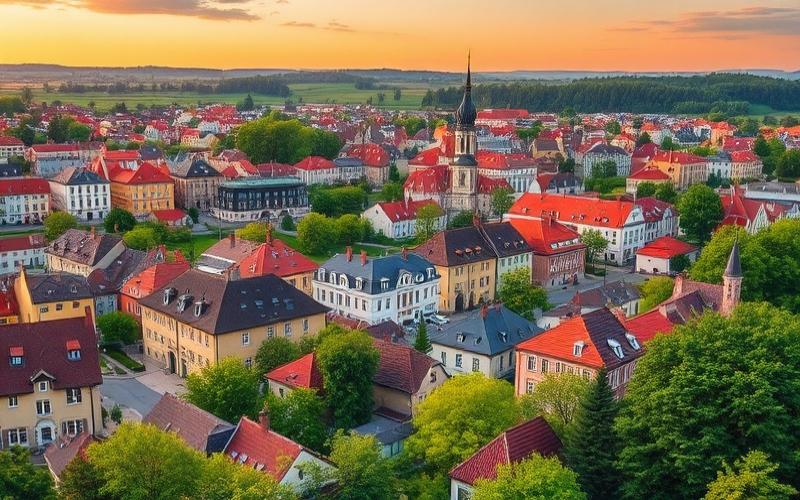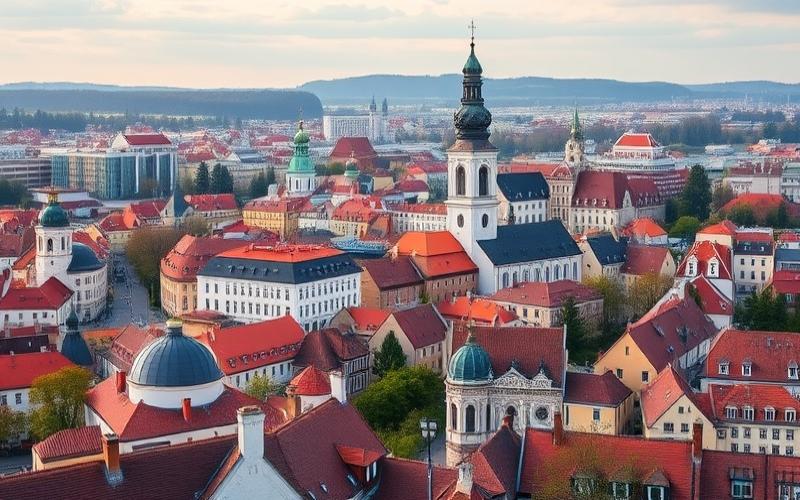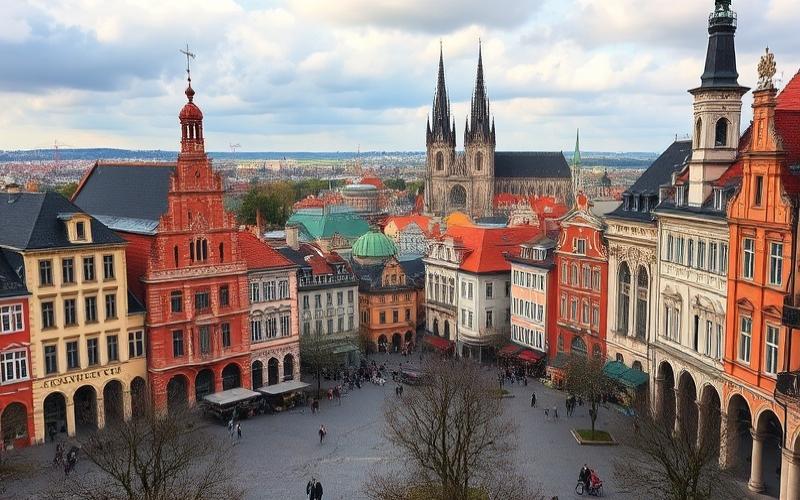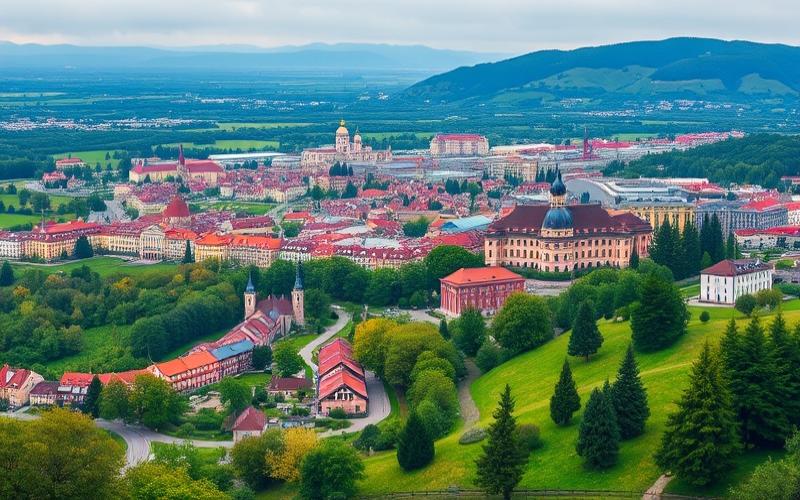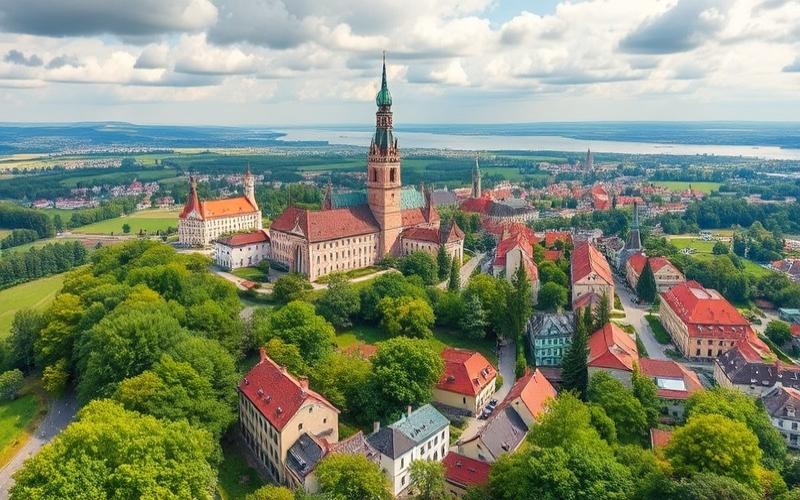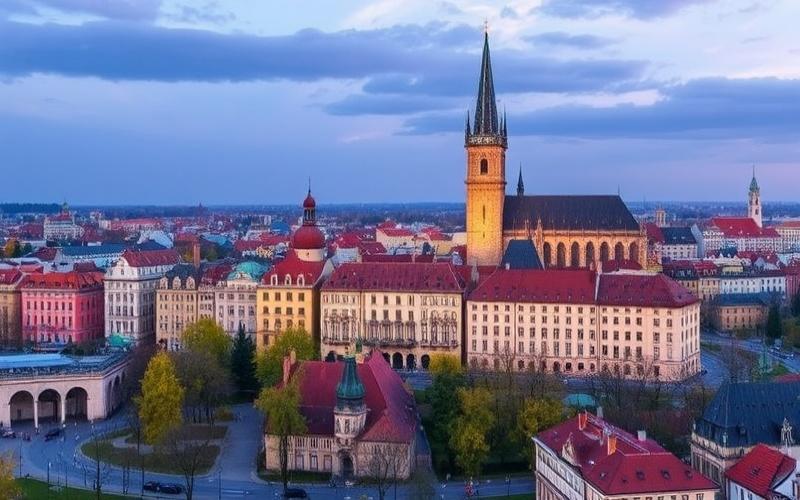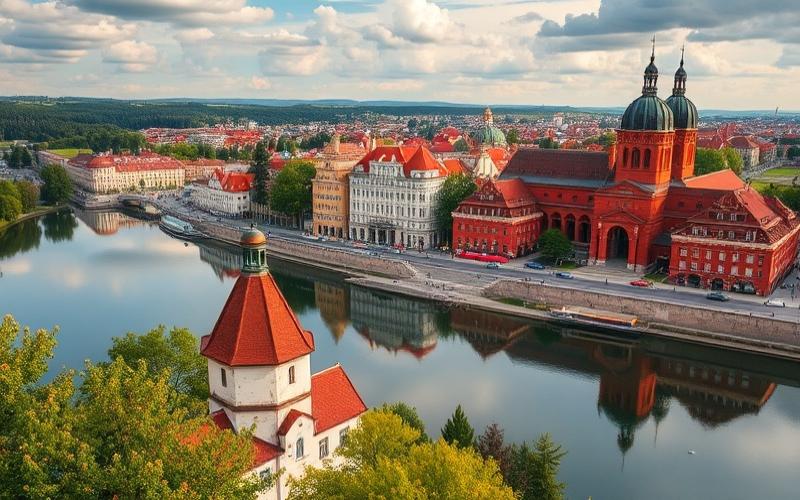
 Published on and written by Cyril Jarnias
Published on and written by Cyril Jarnias
The emergence of digital nomads has radically transformed the economic landscape of many countries worldwide, and Poland is no exception. Attracted by its relatively low cost of living, cultural richness, and growing embrace of technology, these modern workers are increasingly choosing to settle in cities like Warsaw, Krakow, or Wroclaw.
However, their growing influx raises questions about their impact on the local rental market. Indeed, while the arrival of these global professionals energizes certain sectors of the economy, it also puts pressure on rental prices, sometimes increasing the cost of living for local residents.
In this context, understanding the balance between the economic benefits and the social challenges posed by this trend becomes crucial for grasping the lasting influence of these digital nomads in Poland.
Introduction to the Dynamics of Digital Nomads in Poland
The rise of digital nomads in Poland is explained by a combination of economic, cultural, and technological factors that make this country particularly attractive to mobile professionals.
Why Does Poland Attract Digital Nomads?
- Affordable Cost of Living: The average monthly budget ranges between $1,000 and $2,000 depending on the city, which remains significantly lower than in major Western European metropolises.
- Solid Digital Infrastructure: The internet penetration rate reached nearly 90% in 2025, with widespread access to high-speed internet in all major cities.
- Dynamic and Cosmopolitan Culture: Polish cities offer a rich cultural life, diverse cuisine, and recognized historical heritage.
- European Proximity & Easy Mobility: An excellent rail network allows nomads to travel quickly across the country or to other European destinations.
| Key Factor | Detail |
|---|---|
| Monthly Cost (USD) | 1,000 – 2,000 |
| Internet Penetration Rate | ~89.8% |
| Visa-Free Stay Duration | Up to 90 days (for most nationalities) |
| Main Cities | Warsaw, Krakow, Wrocław, Gdańsk |
Recent Statistics on Digital Nomads in Poland
- Poland ranks among the European destinations with the fastest-growing number of digital nomads (+71% in 2025).
- Although there is no specific visa for these mobile workers yet, it is possible to reside there through the standard regime (Schengen visa or national type D visa).
Main Cities Favored by Digital Nomads:
- Warsaw – Modern capital with an extensive offering of coworking spaces
- Krakow – Historic city with a strong international community
- Wrocław – Emerging tech hub with a friendly environment
- Gdańsk – Port city appreciated for its relaxed atmosphere
Impact on the Local Job Market and Infrastructure Adaptation
The growing arrival of digital nomads stimulates the local economy through:
- The rapid growth of coworking spaces and cafes adapted for remote work.
- Increased demand in the short-term rental real estate market.
Local authorities and some private actors are investing in:
- The development of free public Wi-Fi in urban areas,
- The creation of events dedicated to international communities,
- Continuous improvement of the transport/rail network.
The digital dynamic thus transforms not only the economic fabric but also the social and cultural fabric of major Polish urban areas, enhancing their appeal to international talent.
Summary List — Main Reasons Explaining This Enthusiasm:
- Low cost relative to high quality (urban life + services)
- Robust digital infrastructure
- Active cosmopolitan communities
- Simplified access from all over Europe
The phenomenon also contributes to diversifying the local job market through a constant influx of international skills and innovative practices related to flexible work.
Good to Know:
The rise of digital nomads in Poland is explained by several factors, including a relatively low cost of living, a dynamic culture, and solid digital infrastructure. In 2022, approximately 87,000 digital nomads settled temporarily in the country, with Warsaw, Krakow, and Wroclaw leading the list of preferred destinations. These mobile professionals have specific requirements that push the rental market and infrastructure to adapt, notably through an increase in coworking spaces and flexible housing. Consequently, some local companies have adjusted their offerings to attract this skilled and international workforce, positively influencing the dynamics of the Polish job market.
The Rise of Coliving for Digital Nomads in Poland
Coliving is a modern housing model that combines private spaces (bedrooms, sometimes private bathrooms) with shared common areas, such as the kitchen, living rooms, or coworking spaces. This model promotes community living while maintaining each resident’s privacy. It is not limited to sharing an apartment: it is an integrated experience where exchange, professional and social networking, and a certain lifestyle focused on flexibility and sharing are sought.
Why Does This Model Particularly Attract Digital Nomads?
- Ready-Made Community: Digital nomads find in coliving a direct answer to their need for social connection during frequent travels.
- Contractual Flexibility: Possibilities for short or medium-term stays without heavy commitment.
- Spaces Adapted for Remote Work: Many colivings integrate shared offices/coworking to meet mobile professional needs.
- Community Events: Workshops, themed evenings, or sports activities facilitating professional and friendly exchanges.
- Attractive Cost/Value Ratio, especially in cities where traditional housing is expensive.
| Coliving Characteristics | Advantages for Digital Nomads |
| Private + common spaces | Immediate social network |
| Flexible contracts | Less administrative commitment |
| Integrated coworking | Increased productivity |
| Shared services | Simplified management (single monthly payment) |
| Community life | Facilitated cultural/professional exchanges |
Poland particularly appeals to coliving enthusiasts thanks to its dynamic major cities such as Warsaw and Krakow:
- Student and Cosmopolitan Cities, offering a young, international population open to new trends;
- Affordable cost of living compared to Berlin or Prague, while offering advanced digital infrastructure;
- Growing presence of spaces dedicated to remote work;
- Rich cultural atmosphere combined with strong entrepreneurial dynamism.
Recent Data on Coliving Development in Poland
Recent years have seen a clear increase in the number of spaces dedicated to coliving in several major Polish cities:
- Warsaw: more than a dozen new projects launched since 2022
- Krakow & Wrocław: several spaces opened specifically targeting international remote workers
- Specialized platforms now list over 20 addresses certified “coliving” suitable for digital nomads
Sector studies indicate that this market has grown annually between 15% and 25% since 2021—a trend driven by the massive rise in post-pandemic remote work.
Impact on the Polish Rental Market
Potential Advantages:
- For owners/investors:
- Rapid appreciation of properties located near urban centers
- High occupancy rates thanks to constant demand
- Administrative simplification through centralized management
- For traditional tenants:
- Expanded supply but potential pressure on certain segments (small urban apartments)
Challenges Raised:
- Localized inflationary risk on certain property types
- Need for investors/landowners to adapt their economic/contractual models
- Sometimes delicate coexistence between permanent local residents and highly mobile, even ephemeral, communities
Economic, Social & Cultural Factors Explaining This Trend in Poland
- Rapid urbanization around tech/university hubs
- Post-covid acceleration of dematerialized work (“remote first”)
- Growing search among young professionals/freelancers/qualified migrants for a flexible residential experience that is socially structuring
- Cultural value attached to local hospitality combined with a taste for urban innovation
Urban Planning & Sustainable Development Issues Linked to the Coliving Boom
Sustained growth is pushing some Polish municipalities to rethink their urban policies:
- Regulatory adaptation to frame these new residential forms;
- Occasional encouragement via subsidies/real estate conversions: gentle transformation of underused older buildings;
- Potential integration into local strategies against property vacancy or as a lever against sprawl (limiting urban sprawl).
Developers are often encouraged by these collective dynamics towards more eco-design: sharing energy/water/green spaces – thus aligning urban economic growth with municipal CSR objectives.
The coliving phenomenon therefore actively participates not only in residential renewal but also in contemporary reflections around sustainable and inclusive urban models.
Good to Know:
Coliving, a model of sharing living and working spaces, strongly attracts digital nomads due to its flexibility and setting conducive to encounters. Poland, with dynamic cities like Warsaw and Krakow, proves to be a prime destination for this concept, capitalizing on its competitive cost of living and solid technological infrastructure.
Impact of Digital Nomads on the Polish Rental Market
The rise of digital nomadism in Poland is observed through rapid growth in the number of mobile workers attracted by connectivity, moderate cost of living, and the international openness of major Polish cities. In 2025, Poland ranks among the top-rated European destinations by digital nomads and recorded a +71% increase in this user profile on its territory over the last two years. The typical profile is aged on average 36 years (47% between 30-39 years), predominantly male (approximately 78-85%), highly qualified (90% have higher education), and enjoys an average annual income around $124,000.
Main Polish Cities Affected
| City | Rental Impact | Reasons for Attractiveness |
|---|---|---|
| Warsaw | Very Strong | Dynamic capital, coworking hubs |
| Krakow | Strong | Cultural life, universities |
| Wrocław | Medium/Strong | Tech community, accessibility |
| Gdańsk | Growing | Sea proximity & environmental quality |
These cities concentrate the main effects on the rental market.
Impact on Prices and Rental Dynamics
Increased demand for flexible furnished housing has contributed to a notable rise in rents in these urban centers. Owners now prefer more lucrative short-term rentals (Airbnb, Booking) over traditional long-term contracts. This translates to:
- A scarcity of accessible long-term rentals for locals.
- An average rent increase of up to +15 to +25% in some central neighborhoods.
- A gradual shift of the traditional rental stock towards seasonal or monthly offerings dedicated to digital expatriates.
Trends: Short Term vs Long Term
Comparative List:
- Short-Term Rental
- More profitable (+20% on average)
- High occupancy rate thanks to constant flow
- Flexibility appreciated by digital nomads
- Long-Term Rental
- Less financially competitive
- Relative decrease in availability in city centers
Institutional Adaptations and Local Initiatives
- Some municipalities have instituted a mandatory registry for tourist rentals or limited the maximum number allowed per owner.
- Krakow implemented a temporary moratorium on new Airbnb licenses in certain historic districts.
- Platforms collaborate with local authorities to ensure adequate payment of tourist taxes.
Economic Effects & Social Challenges
Economic Advantages:
- Dynamization of the local tertiary sector (restaurants, coworking…)
- Increase in tax revenues thanks to tourist taxes
Challenges:
- Accentuated pressure on access to affordable housing for permanent residents
- Increased risk of rapid gentrification in certain central areas
Recent Statistics – Illustrative Studies
Summary Table:
| Indicator | Value / Observation |
|---|---|
| Digital Nomads Growth* | +71% since 2023 |
| Share of Short-Term Rentals | Up to 38% of rental stock in city center* |
| Warsaw Rent Increase* | (Central neighborhoods) +22% since 2022 |
*Estimates from cross-sectoral analyses.
—
The growing presence of digital nomads is durably shaping the Polish rental market: while it stimulates the local economy and urban innovation, it also calls for balanced regulation to preserve access to affordable housing for all while maintaining the country’s international appeal. The coming years should see the emergence of more public initiatives targeting this dynamic balance between global openness and local social cohesion.
Good to Know:
The number of digital nomads in Poland has seen notable growth, particularly among young independent tech and marketing workers, leading to a rise in rental prices in Warsaw, Krakow, and Wroclaw. Often favoring short-term rentals via platforms like Airbnb, these nomads disrupt the traditional long-term rental dynamic, pushing some owners to reorient their rental strategies. To adapt, some Polish cities have introduced restrictive regulations on short-term rentals to protect local tenants, while others have developed coworking spaces and policies to attract digital talent. Economically, this influx energizes the hospitality and restaurant sectors but intensifies tensions in the local real estate market. A 2023 study revealed that Warsaw saw a 15% increase in average rental prices since the rise of digital nomads, highlighting the opportunity to develop affordable housing to avoid an acute rental crisis in the future.
Challenges and Opportunities for the Polish Real Estate Market Facing Digital Nomads
The Polish real estate market faces an accelerated transformation under the effect of the rise in digital nomadic work, a phenomenon that is changing the demand for short-term housing in major cities.
Current Trends in Digital Nomadic Work and Impact on Rental Demand:
- Poland attracts a growing number of digital nomads thanks to its economic dynamism, affordable costs (average purchase prices in Warsaw around €5,000/m²) and simplified rental taxation.
- Cities like Warsaw, Krakow, or Wroclaw are preferred for their cultural vitality, solid digital infrastructure, and diverse offering of coworking spaces.
- This population favors flexible furnished rentals (1 week to a few months), strongly fueling the private institutional rental market (PRS), whose supply exceeded 21,000 apartments in 2024 with nearly 25,000 additional units in project.
| City | Average Rents (€) | PRS Stock (Housing) | Digital Nomad Attractiveness |
| Warsaw | ~5,000/m² purchase | >8,400 | High |
| Krakow | Similar | ~3,400 (+2,000 projects) | Strong (culture/tourism/IT) |
| Wroclaw | Affordable | Data not specified | Growing |
Specific Challenges for the Real Estate Market:
Local Regulation on Short-Term Rentals
- Local authorities impose or consider restrictions on Airbnb-type rentals to limit the impact on the traditional residential stock.
- Structural shortage remains acute: there is still a shortage of between 1.5 and 2 million apartments. This puts pressure on the balance between tourist/short-term rental and permanent local needs.
- Regulatory uncertainty likely to affect future yields for owners focused solely on the short-term segment.
Infrastructure Adaptation
- Growing need for buildings offering stable high-speed internet, common areas adapted for remote work, and additional services (flexible cleaning, digital management).
- The institutional “Build-to-Rent” sector is developing rapidly but must follow this qualitative evolution to remain attractive to demanding digital nomads.
Opportunities Generated by This Trend:
Potential Increase in Rental Demand
- Regular influx of international workers seeking flexibility and comfort fuels high occupancy rates in professionally managed residences; some projects show less than 5% vacancy even in low season.
- Geographic diversification: while Warsaw remains dominant (60% of transactions), Krakow also benefits widely from the long-term tourism induced by this hybrid “traveler-worker” public.
Increased Real Estate Valuation
Rapid price increase (+17.7% in twelve months recently observed), favored by this new pressure combined with recent decreases in bank interest rates.
Attractive Taxation
Flat tax rate between 8.5% and 12.5%, without social security contributions or resident/non-resident distinction – competitive advantage compared to neighboring European markets.
Practical Recommendations for Polish Real Estate Investors/Owners:
- Diversify your portfolio:
- Prioritize furnished apartments well located in university/business city centers with excellent internet connectivity;
- Adapt your properties:
- Offer flexible all-inclusive contracts integrating digital services & multilingual support;
- Invest in energy/connectivity renovation;
- Actively follow regulatory evolution:
- Stay informed locally regarding potential limitations on Airbnb/short-term rentals;
- Pool via professional platforms or PRS operators
- Outsource management to optimize occupancy/yield without increasing administrative burden;
- Value targeted digital nomad marketing
- Develop a strong presence on specialized international sites & professional social networks oriented towards international mobility;
In summary:
The massive arrival of digital nomads constitutes a major opportunity but imposes rapid technical & strategic adaptation on local actors who wish to sustainably capture this demanding mobile clientele while reconciling local societal expectations regarding permanent affordable housing.
⎡ Tense Market – Numerous Opportunities – Regulatory Vigilance Required ⎦
Good to Know:
With the rise of digital nomadic work, demand for short-term rental housing in Poland, particularly in Warsaw and Krakow, is increasing, posing challenges related to strict local regulations on short-term rentals. Infrastructure must adapt to attract this demographic, which seeks flexibility and connectivity. Although questions of saturation and regulation remain, opportunities abound for owners capable of adapting their offerings with modern amenities and services like coworking. These evolutions can capture this dynamic clientele, thus boosting rental yields. Investors should analyze local trends and consider collaborations with digital platforms to optimize their real estate management and leverage the growing popularity of digital nomads.
Disclaimer: The information provided on this website is for informational purposes only and does not constitute financial, legal, or professional advice. We encourage you to consult qualified experts before making any investment, real estate, or expatriation decisions. Although we strive to maintain up-to-date and accurate information, we do not guarantee the completeness, accuracy, or timeliness of the proposed content. As investment and expatriation involve risks, we disclaim any liability for potential losses or damages arising from the use of this site. Your use of this site confirms your acceptance of these terms and your understanding of the associated risks.







